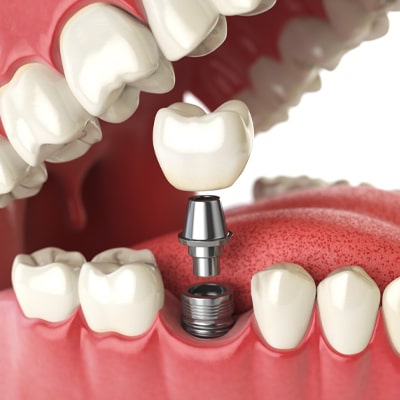What is a dental implant?

| Dental implants are dental prosthetic screws made of titanium that are used to fill missing teeth in the mouth. The implant acts as a root and is recognized by the jawbone as part of the body. A cellular bond is formed with the implant, which is attached to the bone tissue due to its high tissue compatibility. The dental implant as well as the crown acts as a normal tooth, allowing the patient to chew as normal. The patient can easily fulfill functions such as cutting, tearing, and chewing with the implant and the crown. Due to missing tooth(s), gingival recession, slipping, swaying, and falling of existing teeth may occur. As a result, the patient experiences aesthetic problems as well as malnutrition. By replacing the missing tooth, problems that may occur are prevented. With this treatment method, the patient can fulfill all functions as if he/she had his/her main tooth. |

Who is a Dental Implant Suitable For
Dental implant surgery is suitable for individuals who have completed jaw development (adults) and have no underlying medical conditions.
If a patient is undergoing treatment for bone disease, diabetes, or chemotherapy, it is advised that the treatment is finalized before a dental implant procedure. This is the same for breastfeeding mothers. Patients are also advised to stop taking blood thinners a few days before a dental implant procedure.
How is a Dental Implant Procedure Performed?
A dental implant procedure is a surgical operation.There are two types of implant procedures, the first being a one step operation, where a temporary cap is applied, and the other is a two step operation where the screw is inserted inside the gum and requires a healing period. At the initial consultation, an x-ray of the jaw structure is taken to check the suitability of a dental implant. Then the jaw and placement of the implant to be inserted is measured and marked.
The patient is then prepared for surgery where they will be sedated. A small hole is drilled in the patient’s mouth where the implant will be placed. The practitioner decides which treatment method is suitable for the patient. If a one stage implant is required, a temporary cap will be placed on the implant – If a two stage implant is needed the implant is placed into the gum, after some time after the area has healed, a prosthetic cap is attached to the top. In some cases the jawbone and tooth structure positioning allow for a permanent prosthetic cap/tooth to be fitted right away.
In other cases, to aid the healing process and have full function of the teeth, a temporary bridge is attached. In this case, it is necessary to wait for an average of three months for the lower jaw implant and six months for the upper jaw implant to heal. Implants are mainly made of titanium as its very durable and compatible with the human body. Zirconium implants are also used and are popular in treating people with a narrow jaw structure.
What is ‘No Stitches’ Implant Treatment?
Also known as Flapless in medical language, is a technique that does not require cutting or incision hence does not require stitches.
The patient’s suitability is examined by the practitioner with a jaw x-ray. If the patient receives the all clear, the implant can be operated on – with no extra damage on the gums, or stitches and all in one day. This enables a quicker recovery, a more comfortable healing experience with minimum pain.
A permanent coating is also applied on the same day which enables the patient to return to their daily routine a lot sooner.
Recovery Period After a Dental Implant
The recovery and period after a dental implant treatment varies for each patient. The duration varies depending on the patient’s bone and jaw structure as well as the quantity of implants done. Patients with a more structured jaw and bone type can heal as soon as a week to then have the dental implants inserted. However, the expected healing period is three to six months before a dental implant can be inserted.
Although the operation is done under local anesthesia, the patient may feel pain for the first three days after the operation, however this tends to subside within a few days . At the end of the third day, the pain subsides and disappears. The practitioner may prescribe painkillers to help with the mild discomfort.
What to Be Cautious of After a Dental Implant Treatment
After a dental implant procedure, it is very important to strictly follow the instructions on aftercare by the physician. As the procedure falls under a surgical treatment, oral hygiene and extra care must be taken to ensure a healthier and quicker recovery. Some points to consider include:
- Teeth should be thoroughly brushed every single day.
- Dental floss recommended by the dentist should be used.
- Mouthwash should be used and oral hygiene should be maintained
- Check-up dates given by the physician should never be neglected.
For the first two years, check-ups are required twice a year, and once a year for the following year
Benefits of Dental Implants
There are many benefits of having dental implants, with the most obvious being able to replace a missing tooth with a new one.
An alternative treatment called a Bridge technique is also used for teeth loss. This procedure involves cutting the teeth on both sides of the missing tooth to shape, and inserting a material ‘bridge’
This technique may be a good option, however it does cause damage to other healthy teeth.
Some other benefits of dental implants are as follows:
- The dental implant acts as a real tooth where patients don’t feel the difference.
- Aesthetically pleasing and natural looking teeth.
- The implant is placed in the jaw as a tooth root, which is a strong root..
- Dental prostheses can slip out of place or move if not fitted correctly or sized well, which can affect a patient’s speech. Dental implants are fitted well and rooted and will not move.
- Dental implants can be used for a lifetime if taken care of. It does not need to be replaced over time like prosthesis.
Dental Implants FAQ’s
What is a dental implant?
What is a dental implant?
A Dental implant is a method used in the treatment of tooth loss. Titanium or zirconium screws are placed in the patient's jaw where there is tooth loss, to form a root.
Dental implants are also aesthetically natural looking.
Can implants be inserted immediately after a tooth extraction?
Can implants be inserted immediately after a tooth extraction?
If the patient's jaw structure is suitable, an implant may be inserted immediately after a tooth extraction procedure.
How long does a dental implant last?
How long does a dental implant last?
If oral hygiene and proper care is taken, a dental implant can last a lifetime. There should be no need for the implant to be removed or renewed.
Is there any pain during and after a dental implant procedure?
Is there any pain during and after a dental implant procedure?
A dental implant treatment is a surgical procedure, therefore the patient is given local anesthesia to not feel any pain. After the numbness wears off, the patient may feel mild pain that can last up to three days. The practitioner may prescribe painkillers to ease recovery.





